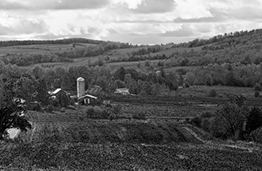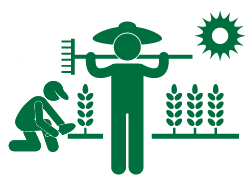 News & Findings
News & Findings
2021 Study Update
- Message from the Executive Committee
- Dicamba Use and Cancer Incidence
- Updates on Mortality
- COVID-19
- Early Life Exposures in Agriculture
- Stress and Farming
- Resources
Message from the Executive Committee
This past year has been unusual because of the challenges from the Covid-19 pandemic. We hope you and your family are well. As you deal with these challenges, we thank you for your continued participation and interest in the Agricultural Health Study (AHS). Through your partnership and participation over the past 25+ years, we have learned a lot about factors affecting the health of farm families as they go about performing this critical work for our nation. In this annual newsletter, we share some recent research findings and information about ongoing study activities. If you would like more information, please visit https://aghealth.nih.gov/ or call 1-800-4-AGSTUDY (1-800-424-7883).
Dicamba Use and Cancer Incidence
Dicamba is an herbicide that has been used since the 1960s for post-emergent weed control in both agricultural and residential settings. It is among the most widely used herbicides in the U.S. About 53% of applicators in the AHS reported using dicamba. We recently examined cancer incidence in those who used dicamba compared to those who did not use this herbicide. The only cancer that showed any association with dicamba use was cancer of the liver and intrahepatic bile duct. Applicators who had the highest use of dicamba were 1.8 times as likely to be diagnosed with this cancer as those who did not use dicamba. This is a rare cancer; only 71 cases were diagnosed in 49,922 applicators from enrollment in the mid-1990s through 2015. Since this is the first study to identify an association between liver and bile duct cancer and dicamba use, more work is needed to determine if dicamba causes this rare cancer.
Lerro et al., Int J Epidemiol, 2020.
Updates on Mortality

We recently compared death rates in the AHS to the general populations of Iowa and North Carolina. Mortality rates have historically been lower in the AHS than the general population. By the end of 2015, about 18% (9,305) of private applicators, 10% (3,384) of spouses, and 9% (415) of commercial applicators enrolled in AHS had died. Death from cardiovascular disease and cancer was lower among private applicators than the general populations of Iowa and North Carolina, underscoring the overall healthy nature of the farm lifestyle. Farmers tend to be more physically active, smoke less, and drink less alcohol than the general population. Private applicators and spouses did have a higher risk of death from injury. Male private applicators had excess mortality from some types of cancer (leukemia, lymphoma, multiple myeloma, prostate cancer, melanoma) and Parkinson’s disease. There was also a suggestion of an increased risk of death for rare causes such as chronic glomerulonephritis (a type of kidney disease) and certain infections. Female spouses also had higher mortality due to lymphoma and some disorders of the immune system.
Farmers have unique work-related exposures such as pesticides, animals, and dusts, as well as risks from operating machinery. We continue to study diseases and exposures related to mortality excess in the AHS, as well as the characteristics and activities that lead to good health in AHS participants.
Shrestha et al., Occupational and Environmental Medicine, 2019.
COVID-19
The COVID-19 pandemic is an ongoing concern, including in rural America.
Early Life Exposures in Agriculture
We will soon invite adult children of AHS participants to enroll in a new study focused on how growing up on a farm may impact health in early adulthood and beyond. We will ask this group to answer online surveys about their health and childhood activities, including activities on the farm. You may hear about this from your children!
Stress and Farming
Farming is an important and rewarding occupation, but at times it can also be very stressful. Many of you, as well as our study advisors, have told us that farming-related stress can be an important health concern. Our follow-up survey asks about recent challenges faced by AHS participants. Of the first 22,000 respondents, more than half (57%) reported they were still farming, and of these, nearly a third reported working another job in addition to farming. Almost half of respondents under the age of 60 reported having too much for one person to do and not enough time for family. About 1 in 5 respondents expressed a good deal of uncertainty about the future and financial markets, or were troubled by the loss of crops or animals due to a natural disaster or bad weather.
In other studies, too much stress has been linked to problems such as poor sleep, weight gain, depression, heart disease, decreased immunity, injuries and accidents, slower healing, and physical pain. More than a third of AHS survey respondents reported chronic pain (for at least 3 months of the year) that interfered with sleep or work. Farmers work hard to take care of their crops and animals, their land, and their families. They need to take care of themselves, too. Everyone has different ways of coping and seeking support. The good news is that many AHS participants reported having people in their lives who they can turn to during tough times.
Resources
NC Agromedicine
Tel: (252)744-1008
Iowa Concern
Tel: 1-800-447-1985
Website
67%
Have someone willing to help with chores when needed.
65%
Have someone to turn to for suggestions on dealing with personal problems
82%
Have someone that makes you feel loved and cared for them rather than you.




